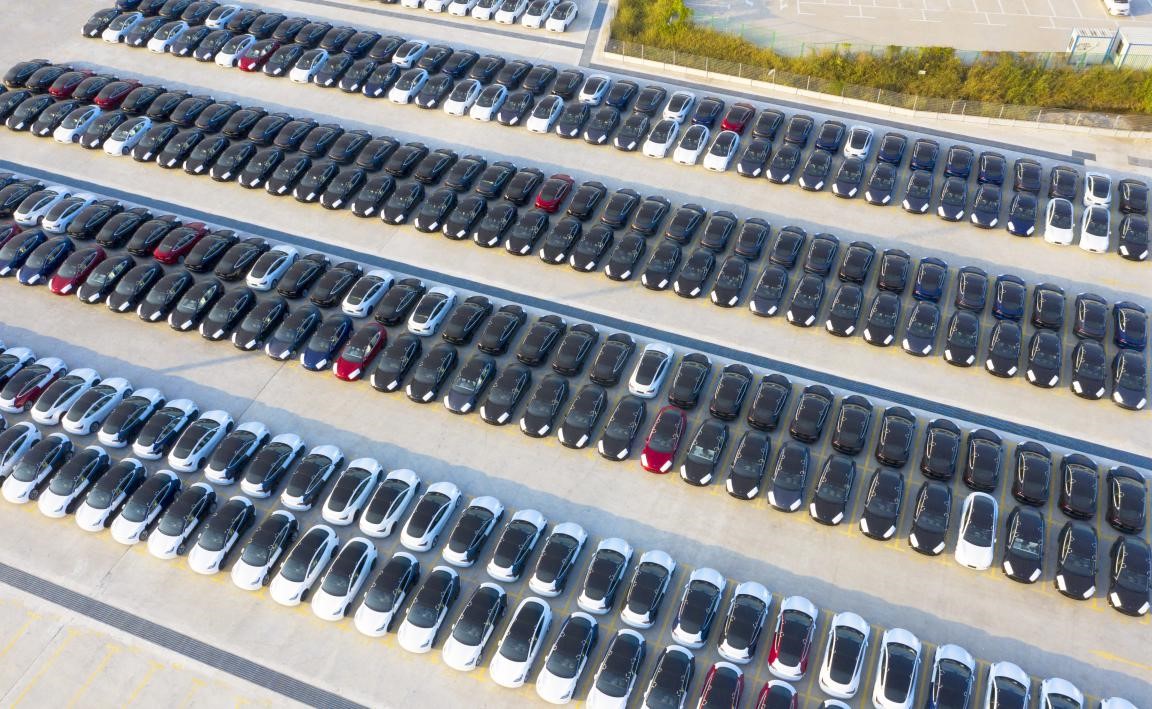

 |
| Vehicles are parked in Tesla's Shanghai Gigafactory after rolling off production line, Oct. 24, 2020. (People's Daily Online/Ji Haixin) |
China's paid-in foreign direct investment (FDI) bucked the trend in the past year despite the complicated international situation and severe impacts from COVID-19, registering increase in size, growth margin, and global share.
In 2020, paid-in FDI reached a record 999.98 billion yuan ($154.32 billion), up 6.2% year-on-year. Over 100 foreign companies were established in China on average each day.
German science and technology company Merck secured remarkable performance in China over the last year. It was among the first group of enterprises in Shanghai to resume production from COVID-19, released its latest investment plan in the performance materials sector at the China International Import Expo, and maintained steady growth in its three major businesses of life science, healthcare and performance materials.
The year of 2020 was full of uncertainty for global economy, said Li Ye, vice president of Merck Holding (China) Ltd. However, the Chinese market still showed strong resilience, she added. "The quick control of the pandemic as well as the policies issued to help enterprises stabilized the confidence of foreign companies investing in China," she said.
The international FDI experienced a huge plunge around the globe the last year except in China. The country's paid-in FDI kept positive monthly growth for 9 consecutive months since April, and recovered positive growth in July.
According to a recent investigation by the Ministry of Commerce (MOFCOM), nearly 60 percent of foreign businesses in China saw improved or equal revenue and profits in 2020 from a year ago, and nearly 90 percent said they were optimistic or cautiously optimistic about their prospects in China.
The growth of paid-in FDI was inseparable from China's efforts to coordinate epidemic prevention and control and economic and social development, said Cao Hongying, executive vice president of the China Association of Enterprises with Foreign Investment. Taking forceful measures, China was the first country to control the pandemic and resume production, and the only major economy that achieved positive growth, which offered a firm foundation and guarantee for stabilizing foreign investment, Cao explained.
Though the COVID-19 pandemic is still spreading across the world, Samsung's projects in China are still proceeding in an orderly manner. This benefitted from the strong support and guarantee by the Chinese government, said Deuk-kyu Hwang, president and head of Samsung China. The company sent over 5,500 foreign engineers to China from overseas by 24 planes last year, so as to ensure the construction of its major projects in the country, he continued.
The South Korean conglomerate invested $5.4 billion in China last year, 83 percent of which went to central and western regions. Ninety-eight percent of the investment was in high-tech industry, Hwang said. The implementation of foreign investment law and China's equal attitude toward domestic and foreign companies very much inspired the group and reinforced its confidence to develop in China, he added.
Accelerating its pace of opening up, China is constantly upgrading its business environment. The country established three new pilot free trade zones, further shortened negative lists of foreign investment, and expanded the catalogue of industries where foreign investment is encouraged. Besides, China also inked the Regional Comprehensive Economic Partnership and completed the negotiation on China-EU Comprehensive Agreement on Investment.
The MOFCOM also established a taskforce to serve 697 major foreign investment projects, helping them tackle over 3,000 challenges such as short supply of anti-pandemic materials, customs clearance, and work resumption of industrial chains. In addition, the taskforce also facilitated entrance for over 16,000 foreign employees.
 |

 Award-winning photos show poverty reduction achievements in NE China's Jilin province
Award-winning photos show poverty reduction achievements in NE China's Jilin province People dance to greet advent of New Year in Ameiqituo Town, Guizhou
People dance to greet advent of New Year in Ameiqituo Town, Guizhou Fire brigade in Shanghai holds group wedding
Fire brigade in Shanghai holds group wedding Tourists enjoy ice sculptures in Datan Town, north China
Tourists enjoy ice sculptures in Datan Town, north China Sunset scenery of Dayan Pagoda in Xi'an
Sunset scenery of Dayan Pagoda in Xi'an Tourists have fun at scenic spot in Nanlong Town, NW China
Tourists have fun at scenic spot in Nanlong Town, NW China Harbin attracts tourists by making best use of ice in winter
Harbin attracts tourists by making best use of ice in winter In pics: FIS Alpine Ski Women's World Cup Slalom
In pics: FIS Alpine Ski Women's World Cup Slalom Black-necked cranes rest at reservoir in Lhunzhub County, Lhasa
Black-necked cranes rest at reservoir in Lhunzhub County, Lhasa China's FAST telescope will be available to foreign scientists in April
China's FAST telescope will be available to foreign scientists in April